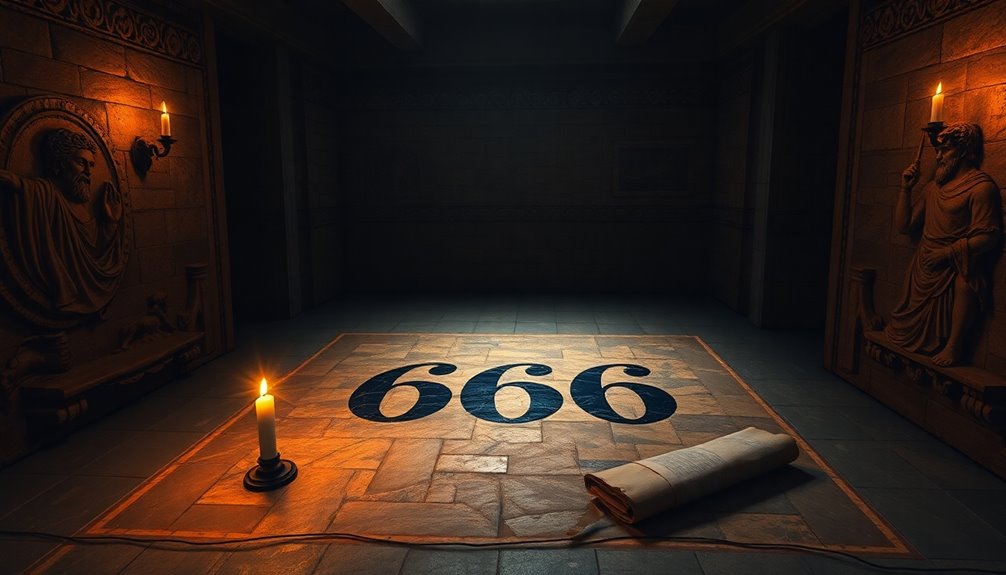The number 666, often dubbed the "number of the Beast," holds immense significance, symbolizing imperfection and evil. It echoes through biblical texts, particularly Revelation, linking it to the tyranny faced by early Christians under Nero Caesar. This number's ominous reputation extends into modern culture, sparking various myths and superstitions. Misunderstandings also arise due to manuscript variations, like 616, which complicate its legacy. Ultimately, 666 challenges you to ponder moral choices in a broader context. If you want to uncover deeper layers of meaning surrounding this infamous number, keep exploring its intriguing history and implications.
Key Takeaways
- 666, known as the "number of the Beast," symbolizes ultimate evil and imperfection, contrasting the divine completeness of the number seven.
- Historical ties to Nero Caesar enhance its ominous reputation, as it reflects the persecution of early Christians during his tyrannical reign.
- Manuscript variations, like those found in Papyrus 115, introduce confusion with the number 616, complicating the interpretations and significance of 666.
- The cultural legacy of 666 extends into modern media, often representing evil and imperfection, while also fueling conspiracy theories and superstitions.
- Ethical reflections on 666 encourage discussions around moral choices and spiritual discernment, highlighting the importance of community values in navigating life's challenges.
Introduction

The number 666 holds a significant place in religious and cultural discussions, often evoking fear and intrigue. Known as the "number of the Beast," it symbolizes evil and imperfection, standing in stark contrast to the divine perfection represented by the number seven. This infamous numeral isn't just a random figure; it's steeped in historical context.
For instance, in gematria, the Hebrew transliteration of "Nero Caesar" totals 666, linking it directly to the notorious Roman emperor, thus enhancing its ominous reputation.
The repetition of the number six in 666 amplifies its negative connotation, as it mocks the idea of completeness. This theme of imperfection resonates deeply within various religious contexts.
Additionally, manuscript variations, like those found in Papyrus 115, show discrepancies where some texts list the number as 616. Such differences raise questions about how biblical texts have been interpreted and transmitted over time.
You'll find that the number 666 has been analyzed through diverse lenses, including Idealism and Preterism, which fuels ongoing debates about its symbolic meaning and historical implications, particularly concerning figures like Nero.
Understanding these facets reveals why 666 remains a topic of fascination and concern.
Biblical Significance of 666

When you explore the biblical significance of 666, you'll find its primary reference in Revelation 13:18, where it's labeled the "number of the Beast."
This verse not only underscores its connection to ultimate evil but also invites you to consider secondary references that deepen its meaning.
Understanding these texts can give you a clearer picture of why 666 has captured attention throughout history.
Primary Bible References
In exploring the biblical significance of 666, you'll find that its most prominent reference comes from Revelation 13:18, where it's labeled as the "number of the Beast." This number starkly symbolizes imperfection and stands in stark contrast to the divine completeness represented by the number seven. The repetition of the digit six amplifies its negative connotation, seen as a mockery of divine perfection.
Interestingly, in the context of gematria, the transliteration of "Nero Caesar" into Hebrew totals 666, linking this number to the notorious Roman Emperor known for persecuting early Christians. This historical connection deepens the number's significance, suggesting that it represents more than just a symbol of evil; it ties back to a specific time and place in biblical history.
Moreover, manuscript variations, such as those in Papyrus 115, reveal discrepancies, with some texts citing the number as 616 instead. This variation highlights the complexities in interpreting biblical references to 666.
The theological interpretations have led to broader views, with some seeing 666 as a general representation of evil rather than a direct reference to a specific individual.
Secondary Bible References
Exploring secondary Bible references reveals additional layers of meaning surrounding the number 666. In Revelation 13:18, it's identified as the number of the Beast, symbolizing imperfection and standing in stark contrast to the divine completeness represented by the number seven. This connection emphasizes the spiritual significance of 666 in Christian eschatology.
Interestingly, gematria links 666 to Nero Caesar, whose name translates to the same numerical value in Hebrew. This association not only highlights the historical context of the early Christian persecutions under Nero but also enhances the ominous reputation of the number.
Moreover, some manuscripts, like Papyrus 115, present a variation of the Beast's number as 616. This discrepancy suggests complexities and possible scribal errors in early biblical texts, raising questions about the significance of 666 itself.
Interpretative approaches, such as Preterism, argue that the prophecies surrounding this number were fulfilled during Nero's reign, connecting it to the socio-political climate of the time.
Ultimately, these secondary references deepen your understanding of 666's role in biblical prophecy and its implications for early Christians facing persecution.
Numerical Symbolism in Ancient Rome

Throughout Ancient Rome, numerical symbolism played a crucial role in shaping societal beliefs and practices. Numbers weren't just tools for counting; they held deeper meanings tied to power, fate, and the divine. For instance, the number 666 is intricately linked to Nero Caesar through gematria, showcasing how numerical values encoded significant political figures and events.
When you see "DCLXVI" representing 666, it's a reminder that Roman numerals enriched narratives in literature and religious texts, adding layers of meaning.
Moreover, Romans believed that specific numbers wielded mystical or divine qualities, influencing everything from architecture to astrology. The architectural designs often reflected these beliefs, incorporating specific numerical patterns thought to channel divine favor.
The historical context of Nero's reign, characterized by extravagance and tyranny, gives the number 666 a chilling significance. It mirrors the societal fears and moral judgments of leadership during that tumultuous era.
Cultural Impact of 666

The legacy of the number 666 extends far beyond ancient Rome, weaving itself into the fabric of modern culture. Often dubbed the "number of the Beast," it's become a powerful symbol in films, music, and literature, representing evil and foreboding themes. In Christian theology, this number embodies imperfection, directly opposing the divine completeness of seven, which profoundly influences various cultural narratives.
Historical associations, particularly with figures like Nero Caesar, have shaped how you perceive 666 as a symbol of tyranny and persecution. It's not just the arts where you see its impact; conspiracy theories and superstitions abound. Many believe that encountering 666 brings bad luck or even signifies impending doom, heightening its ominous reputation.
Moreover, you'll notice that merchandise, art, and branding often incorporate 666, reflecting its controversial and provocative nature. This continued use sparks discussions about morality and belief systems in contemporary society, making the number a focal point of fascination and fear.
Whether you embrace or reject its symbolism, it's clear that 666 influences cultural conversations and perceptions, ensuring its legacy endures.
Misunderstandings About 666

You might think 666 is just a universal symbol of evil, but that overlooks its historical ties to figures like Emperor Nero.
Many also confuse it with 616 due to early manuscript variations, which can muddy the waters of its true significance.
Debunk Common Misconceptions
When it comes to the number 666, many misconceptions distort its true significance. While you might hear that it's universally evil, that's not entirely accurate. In the Book of Revelation, 666 symbolizes imperfection rather than outright malevolence, reflecting a deeper allegorical meaning.
Another common misunderstanding is the belief that 666 is solely tied to Nero, a ruler known for his tyranny. While his actions may have contributed to its association, 666 also represents broader opposition to divine completeness.
You may not realize that 666 has different values in gematria, with some manuscripts suggesting alternatives like 616. This highlights variations in historical interpretations that often get overlooked.
Additionally, viewing 666 as a static concept ignores the Idealist perspective. This viewpoint suggests that the number conveys timeless symbols and meanings, not just references to specific individuals or events.
Numerical Inaccuracies in Interpretations
Misunderstandings about 666 often stem from numerical inaccuracies that skew its interpretation. For instance, various ancient manuscripts present different figures; some, like Papyrus 115, identify the number as 616 instead of 666. This discrepancy can lead you to question which number truly represents the Beast.
Gematria, the practice of assigning numerical values to letters, further complicates matters. While the transliteration of Nero Caesar in Hebrew sums to 666, alternative transliterations can yield different results, creating confusion regarding its true significance.
Additionally, theological interpretations vary widely. Some scholars argue that 666 specifically refers to Nero, while others believe it symbolizes a broader concept of imperfection and evil.
It's crucial to recognize that the Book of Revelation employs allegory and symbolism to convey deeper meanings. This context is often overlooked, leading to misinterpretations of 666.
The ongoing debate about whether 666 or 616 holds the true meaning highlights the complexities inherent in biblical texts. Scribal errors and translation variations can result in significant discrepancies, making it vital for you to approach this number with a nuanced understanding.
Daily Decision-Making Strategies

When you face daily decisions about ethics and engage in discussions within your faith-based community, having a clear strategy can make a big difference.
By applying tools like the Eisenhower Matrix or the two-minute rule, you can prioritize what truly matters.
These approaches not only streamline your choices but also align them with your core values.
Daily Choices on Ethics
Making daily choices on ethics is crucial for shaping our lives and communities. Each decision you make requires weighing your personal values against societal norms. This process often prompts you to reflect on your beliefs and consider the potential impacts of your choices.
Research shows that ethical dilemmas can activate different areas of your brain, leading to varied outcomes influenced by emotion and reason.
To navigate these daily ethical choices, consider implementing a framework like the "Four-Way Test." Ask yourself:
- Is it the truth?
- Is it fair?
- Will it build goodwill and better friendships?
- Will it be beneficial to all concerned?
This approach can steer your decisions toward more ethical outcomes.
Additionally, engaging in regular self-reflection and mindfulness practices can enhance your decision-making skills. By increasing your awareness of personal biases and emotional triggers, you can make more informed choices. Understanding emotional regulation can also aid in managing the emotional aspects of decision-making.
Studies indicate that those who prioritize ethical considerations in their daily lives report higher levels of satisfaction and trust within their communities.
Faith-Based Community Discussions
In faith-based communities, discussing the symbolism of numbers like 666 can provide valuable insights into daily decision-making strategies. This number, often linked to the Antichrist, serves as a cautionary symbol that prompts you to reflect on your moral choices and the importance of spiritual discernment. Many faith leaders encourage you to see 666 not just as a representation of evil, but as a reminder to remain vigilant in your daily decisions, ensuring they align with your values and beliefs.
When engaging in community discussions, you might explore how 666 contrasts with the divine number seven, highlighting themes of completeness and imperfection in your faith journey. These conversations can deepen your understanding of biblical texts, enhancing your ability to apply these teachings to contemporary challenges.
Moreover, reflecting on the symbolism of 666 can inspire you to actively seek and interpret signs in your life. By embracing this proactive approach, you can navigate cultural challenges while living out your faith with intention.
Ultimately, these discussions foster a supportive environment where you and your fellow members can grow spiritually and make more mindful decisions in your everyday lives.
Final Thoughts on 666

Considering its complex history and multifaceted interpretations, the number 666 continues to captivate both scholars and casual readers alike. Often recognized as the "number of the Beast" in the Book of Revelation, it symbolizes imperfection and contrasts with the divine completeness represented by seven. This connection to imperfection resonates with many, prompting you to reflect on its broader implications.
Delving deeper, you might discover the gematria link to Nero Caesar, a figure notorious for tyranny and the persecution of early Christians. This historical context, particularly during Nero's reign and the Great Fire of Rome, enhances 666's association with evil and chaos. It's no wonder that this number stirs up such intense emotions.
Moreover, the variations in manuscripts, such as the alternate 616 found in Papyrus 115, challenge your understanding and interpretation of 666. This complexity invites diverse perspectives, encouraging you to engage in ongoing discussions about its significance.
Ultimately, whether you view 666 as a mere historical curiosity or a symbol of deeper moral lessons, its allure remains undeniable, making it a topic worth exploring further.
Additional Resources

What resources can deepen your understanding of the number 666? To explore its biblical roots, start with the Book of Revelation, particularly Revelation 13:18, where 666 is introduced as the "number of the Beast." Understanding this context is crucial, as it symbolizes imperfection and challenges the divine completeness of seven.
For a more in-depth analysis, consider delving into gematria. This ancient method assigns numerical values to Hebrew letters, connecting significant historical figures like Nero Caesar to 666. Books on biblical numerology can further illuminate how these interpretations have evolved over time.
You might also find it helpful to look into historical texts that document Nero's reign and the persecution of Christians, shedding light on why 666 symbolizes tyranny.
Additionally, exploring manuscript variations—like the alternative number 616 found in Papyrus 115—can reveal the complexities of ancient scriptural interpretations.
Finally, engage with scholarly works on interpretative theories like Idealism and Preterism. They provide diverse perspectives, enriching your understanding of 666's significance in both historical and symbolic contexts.
Frequently Asked Questions
Why Is 666 Considered an Evil Number?
You might wonder why 666 is seen as an evil number. It represents imperfection, being one less than the divine number seven, which symbolizes completeness.
The repetition of the number six amplifies its negative connotation, linking it to unholiness. Additionally, through gematria, it's associated with Nero Caesar, a figure known for tyranny.
These elements together create a strong perception of 666 as an affront to goodness and divine order in various interpretations.
What Does the Number 666 Mean Spiritually?
Spiritually, 666 represents a profound symbol of imperfection and a challenge to divine completeness.
You might see it as a reminder of the struggle against evil and oppression, especially in the context of early Christianity. The repetition of the number six emphasizes its negative connotation, often viewed as a mockery of the divine.
However, some interpret it as a timeless symbol of resistance against tyranny, urging you to seek truth and justice.
Is Seeing 666 a Bad Thing?
Seeing 666 doesn't have to be a bad thing.
While many associate it with negativity, it can also serve as a reminder to reflect on your moral and spiritual state. Instead of fearing it, you might consider it an invitation for introspection.
Why Is 666 Feared?
You might fear 666 because it's tied to the idea of ultimate evil in religious texts, particularly in the Book of Revelation.
This number represents imperfection, contrasting sharply with the divine perfection of seven.
Historical links to figures like Emperor Nero amplify its ominous reputation, while cultural portrayals in movies and literature fuel the perception of 666 as a symbol of disaster and the Antichrist.
All these factors create an aura of dread around it.










